As the golden hues of summer fade, the crisp air of autumn ushers in the anticipation of the most festive time of the year—winter holidays. With this season comes a heightened spirit of gifting, and the demand for cosmetics, health, and beauty products skyrockets. This period presents a remarkable opportunity for manufacturers to showcase their innovations and capture the hearts of consumers.
For those in the health and beauty industry, the time is ripe to unveil your unique formulations. Whether you’re an established brand looking to expand your market or a newcomer eager to make a mark, the upcoming months offer a perfect platform to dazzle the world with your creations. However, navigating the complex regulatory and quality compliance landscape is essential to ensure your success, mainly if you aim to internationalise your products.
This article provides a comprehensive guide to launching your cosmetics and beauty products in the UK, providing insights into the steps necessary to achieve both market success and regulatory compliance.
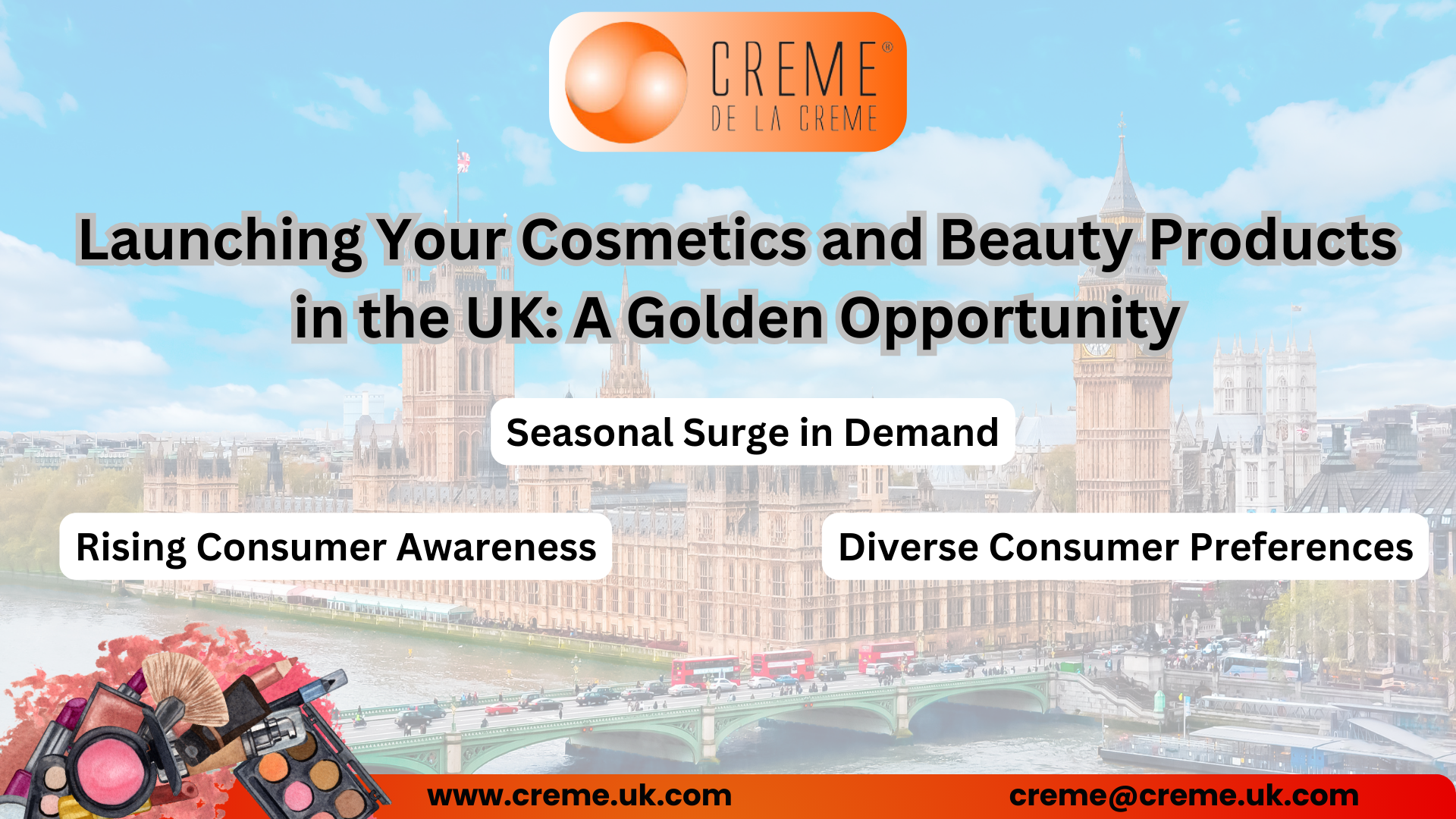
The Growing UK Beauty Market: Why You Should Take Notice
The UK’s beauty and personal care market is one of the most lucrative in the world, characterised by a high level of consumer spending and a strong preference for quality and innovation. In 2023, the market size was estimated at over £10 billion, with a steady growth trajectory expected in the coming years. Several factors drive this robust demand:
Rising Consumer Awareness: UK consumers are increasingly conscious of the ingredients in their cosmetics and beauty products. They favour brands that are transparent, ethical, and environmentally friendly.
Diverse Consumer Preferences: The UK market caters to a wide range of consumer preferences, from luxury skincare to vegan and cruelty-free options. This diversity offers ample opportunity for niche and speciality brands.
Seasonal Surge in Demand: The winter holiday season is a peak period for the beauty industry. Products such as lotions, body washes, and cosmetics are in high demand, making this an ideal time to launch new products.
Regulatory Compliance: The Foundation of Your Success
Before you can bring your products to market in the UK, it's crucial to ensure they meet all relevant regulatory requirements. Non-compliance can result in fines, product recalls, and even legal action, so getting this right from the start is imperative.
1. Understanding the UK’s Regulatory Framework
The UK has stringent regulations governing the safety, labelling, and marketing of cosmetics and beauty products. These are primarily outlined in the Cosmetics Regulation (EC) No 1223/2009, which remains in force post-Brexit, albeit with some adjustments specific to the UK.
Key aspects of the UK regulatory framework include:
Safety Assessment: All cosmetics and beauty products must undergo a safety assessment before being marketed in the UK. This assessment must be conducted by a qualified safety assessor who evaluates the product’s ingredients, manufacturing process, and intended use.
Product Information File (PIF): Every product must have a Product Information File (PIF) that includes detailed information about the product’s composition, safety assessment, and labelling. The PIF must be readily accessible to regulatory authorities.
Labelling Requirements: UK regulations mandate that product labels include specific information, such as the name and address of the Responsible Person, a list of ingredients, and any warnings or precautions. The label must also comply with language requirements, ensuring that all information is clear and easily understandable to consumers.
Notification to the UK Cosmetic Products Notification Portal (UKCPNP): Before a product is placed on the market, it must be notified to the UKCPNP. This involves providing detailed information about the product, its ingredients, and the Responsible Person.
2. The Role of the Responsible Person
In the UK, the Responsible Person (RP) is a legal entity responsible for ensuring that a cosmetic product complies with all regulatory requirements. The RP can be the manufacturer, importer, or a third-party organisation. The RP’s responsibilities include:
Ensuring that the product undergoes a safety assessment.
Maintaining the PIF and ensuring it is up to date.
Notifying the product to the UKCPNP.
Addressing any regulatory inquiries or issues that arise after the product is placed on the market.
If you’re based outside the UK, it’s essential to designate an RP within the UK to handle these responsibilities. This ensures that your products can be legally sold in the UK market.
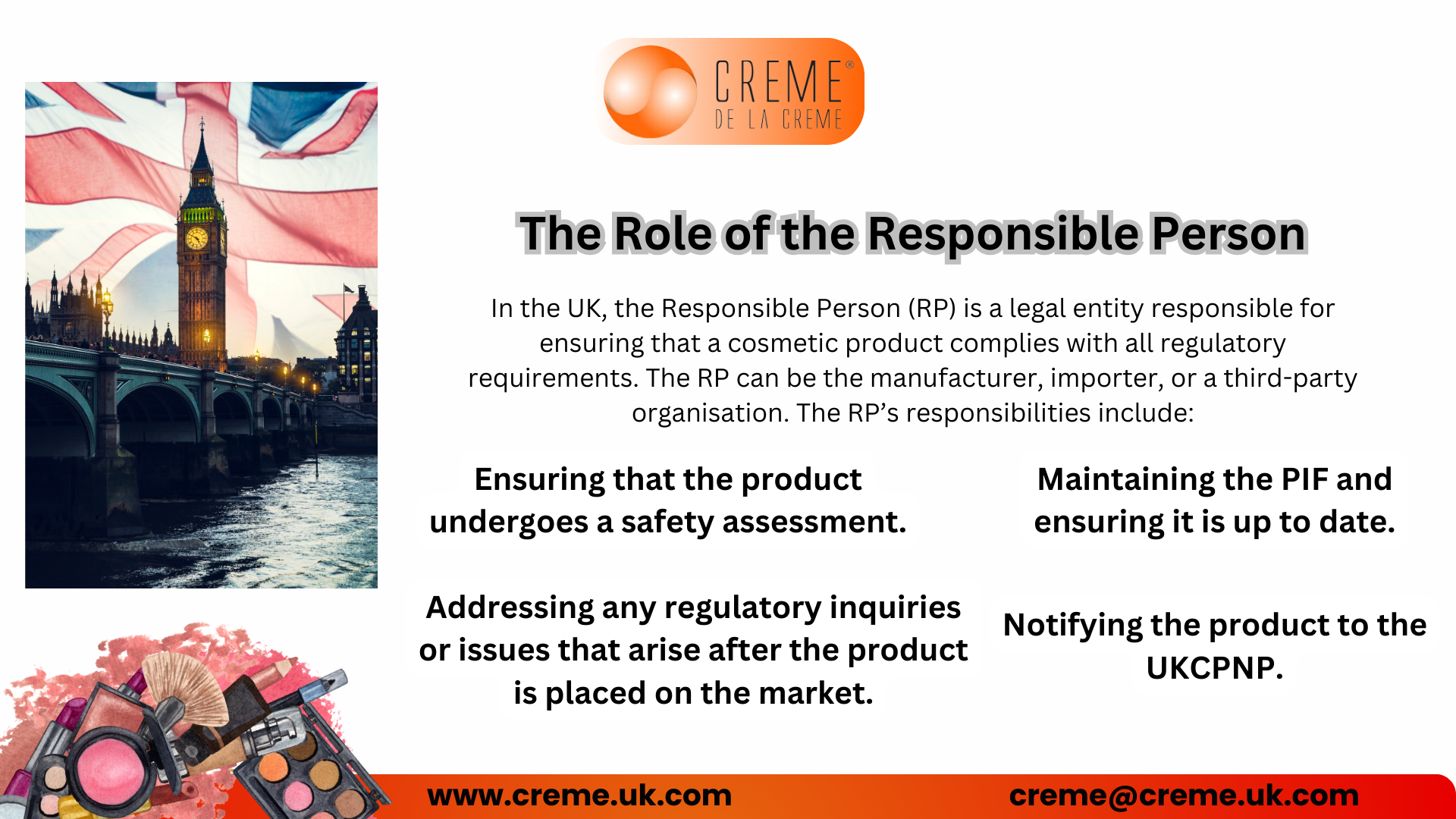
Quality Compliance: Ensuring Your Products Stand Out
While regulatory compliance is the foundation of your product launch, quality compliance ensures that your products meet the high standards expected by UK consumers. This includes your products' safety and efficacy consistency, presentation, and consumer appeal.
1. Adopting Good Manufacturing Practices (GMP)
Good Manufacturing Practices (GMP) are guidelines that ensure products are consistently produced and controlled according to quality standards. In the UK, adherence to GMP is not just recommended—it’s expected.
Key elements of GMP include:
Controlled Environment: Manufacturing facilities must be clean and controlled to prevent product contamination. This includes proper ventilation, temperature control, and sanitation procedures.
Training and Hygiene: All personnel involved in the manufacturing process must be adequately trained and adhere to strict hygiene standards. This minimises the risk of contamination and ensures product quality.
Documented Procedures: All manufacturing processes should be documented; these records must be maintained and available for inspection. This ensures traceability and accountability in the event of a quality issue.
Quality Control: Regular testing and quality checks should be conducted at various stages of production to ensure that products meet the specified standards. Any deviations from the standards should be documented and addressed promptly.
2. Implementing a Quality Management System (QMS)
A Quality Management System (QMS) is a formalised system that documents the processes, procedures, and responsibilities for achieving quality policies and objectives. Implementing a QMS can help you:
Ensure consistency in product quality.
Identify and address potential quality issues before they reach the market.
Improve customer satisfaction by delivering products that meet or exceed expectations.
A robust QMS includes regular audits, continuous improvement processes, and a focus on customer feedback. By implementing a QMS, you demonstrate your commitment to quality and regulatory compliance, which can enhance your brand’s reputation in the UK market.
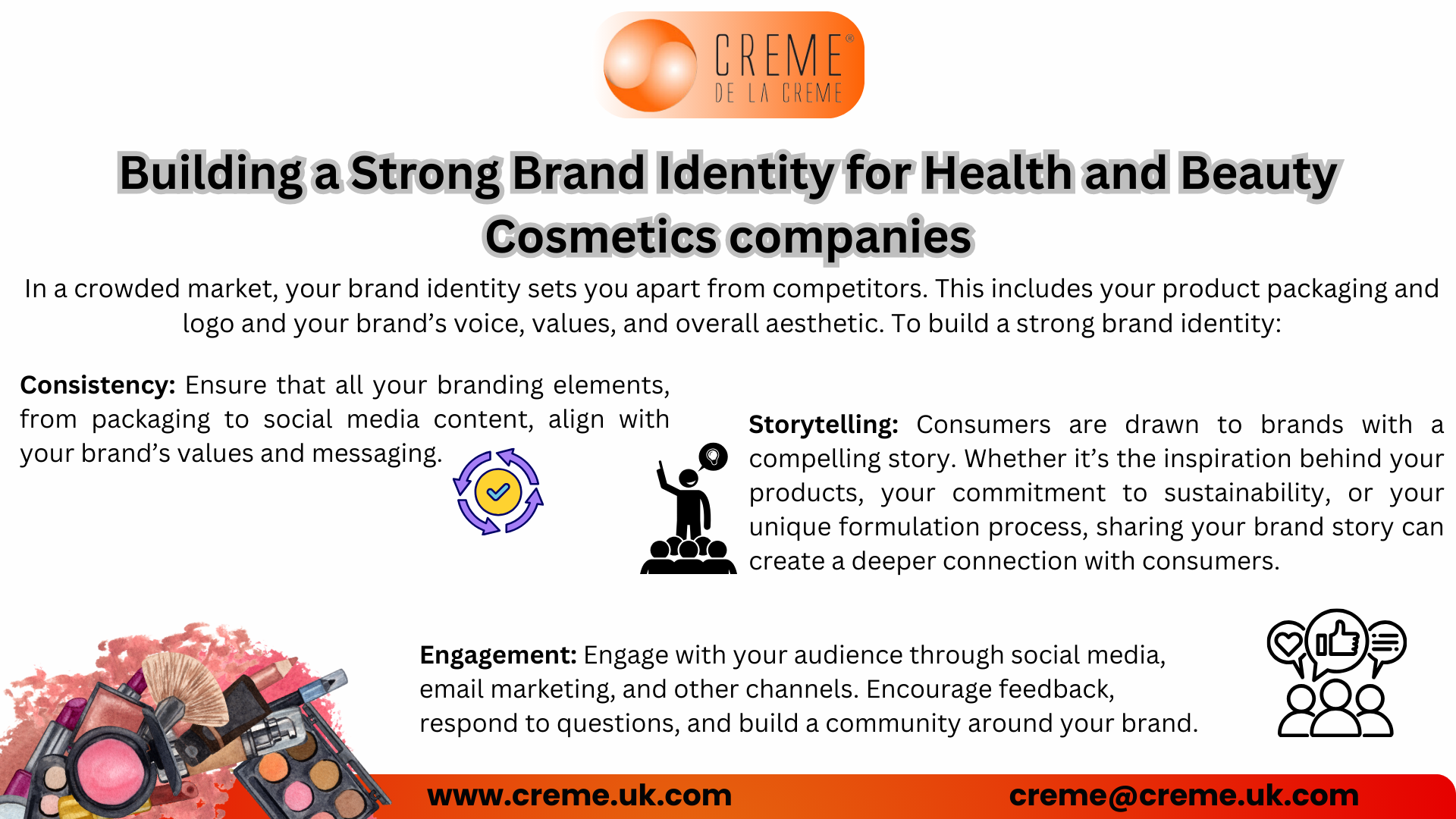
Marketing Your Products: Capturing the UK Consumer’s Attention
Once your products meet all regulatory and quality requirements, the next challenge is capturing the attention of UK consumers. The beauty market in the UK is highly competitive, so it’s essential to develop a strong marketing strategy that resonates with your target audience.
1. Understanding Your Target Audience
The UK beauty market is diverse, with consumers ranging from luxury buyers to budget-conscious shoppers. To successfully market your products, you must understand your target audience and tailor your messaging accordingly.
Consider factors such as:
Demographics: Age, gender, income level, and location all influence consumer preferences and buying behaviours.
Psychographics: Understanding your target audience's values, attitudes, and lifestyle choices can help you create marketing messages that resonate on a deeper level.
Trends: Keeping up with current beauty trends in the UK, such as the growing demand for vegan, cruelty-free, and sustainable products, can help you position your brand effectively.
2. Building a Strong Brand Identity
In a crowded market, your brand identity sets you apart from competitors. This includes your product packaging and logo and your brand’s voice, values, and overall aesthetic.
To build a strong brand identity:
Consistency: Ensure that all your branding elements, from packaging to social media content, align with your brand’s values and messaging.
Storytelling: Consumers are drawn to brands with a compelling story. Whether it’s the inspiration behind your products, your commitment to sustainability, or your unique formulation process, sharing your brand story can create a deeper connection with consumers.
Engagement: Engage with your audience through social media, email marketing, and other channels. Encourage feedback, respond to questions, and build a community around your brand.
3. Leveraging Digital Marketing
Digital marketing is a powerful tool for reaching UK consumers. From social media campaigns to influencer partnerships, there are numerous ways to promote your products online.
Social media: Platforms like Instagram, TikTok, and Pinterest are popular among beauty consumers. Use these platforms to showcase your products, share tutorials, and engage with your audience.
Influencer Marketing: Partnering with beauty influencers can help you reach a wider audience and build credibility. Choose influencers whose values align with your brand and whose followers match your target demographic.
SEO and Content Marketing: Optimizing your website for search engines and creating valuable content, such as blog posts and video tutorials, can drive traffic to your site and increase brand visibility.
Expanding Your Reach: Internationalising Your Brand
While the UK market offers significant opportunities, expanding your reach to other markets can further boost your brand’s success. However, this requires careful planning and a deep understanding of the regulatory landscape in each target market.
1. Researching International Markets
Before expanding internationally, research potential markets to identify where your products are likely to succeed. Consider factors such as:
Market Size and Growth Potential: Look for markets with a growing demand for beauty products and a strong economy.
Consumer Preferences: Understand consumers' preferences and buying behaviours in each market. For example, some markets may prioritise natural and organic products, while others may prioritise luxury items.
Regulatory Requirements: Each country has its regulatory requirements for cosmetics and beauty products. Ensure that your products comply with these regulations before entering a new market.
2. Adapting to Local Preferences
It’s important to adapt your products and marketing strategies to suit local preferences when expanding internationally. This may involve:
Product Adaptation: Modifying product formulations, packaging, or labelling to meet local preferences or regulatory requirements.
Localised Marketing: Tailoring your marketing messages and campaigns to resonate with local consumers. This may involve translating content, adjusting visuals, or incorporating cultural references.
Building Local Partnerships: Partnering with local distributors, retailers, or influencers can help you navigate the market and build consumer credibility.
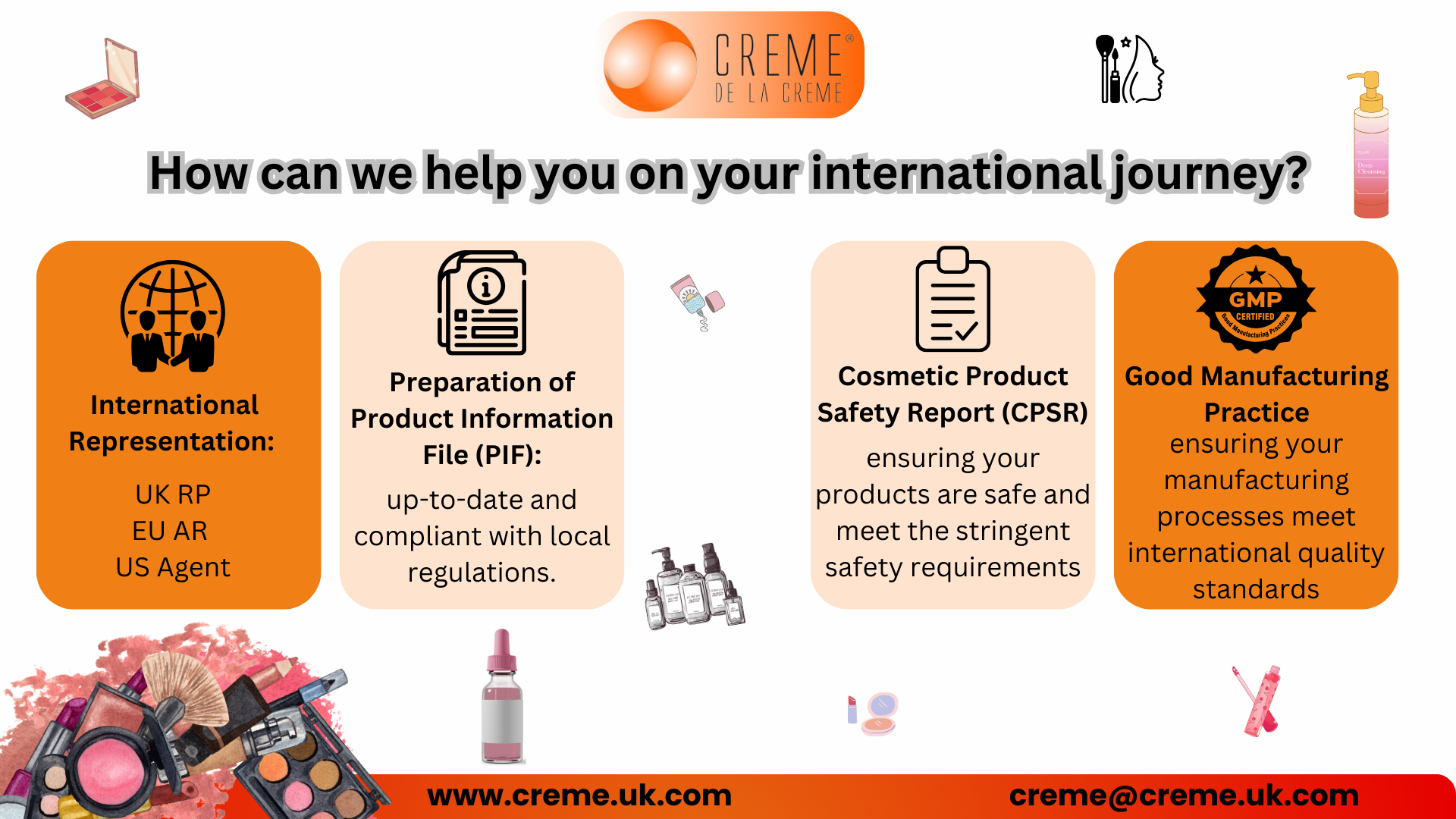
How can we help?
To ensure your product launch is seamless and compliant with global standards, partnering with a seasoned expert can make all the difference. At Crème de la Crème, we specialise in regulatory and quality compliance consultancy, helping manufacturers navigate complex requirements without letting regulatory challenges dim your brand’s shine. Our services include:
International Representation: We act as your EU Responsible Person (EURP), UK Responsible Person (UKRP), or US Agent, ensuring your products meet the specific regulatory needs of each market.
Preparation of Product Information File (PIF): Our team meticulously compiles and maintains your PIF, ensuring all necessary documentation is up-to-date and compliant with local regulations.
Cosmetic Product Safety Report (CPSR): We prepare your CPSR, ensuring your products are safe and meet the stringent safety requirements before they go on the market.
Good Manufacturing Practices (GMP) Implementation: We help you implement GMP, ensuring your manufacturing processes meet international quality standards, minimising risks and enhancing product safety.
From launching in the EU, UK, USA, India, and beyond, we provide comprehensive support to help your products succeed globally. Let us guide you through the regulatory landscape so you can focus on what you do best—creating products that captivate and inspire.
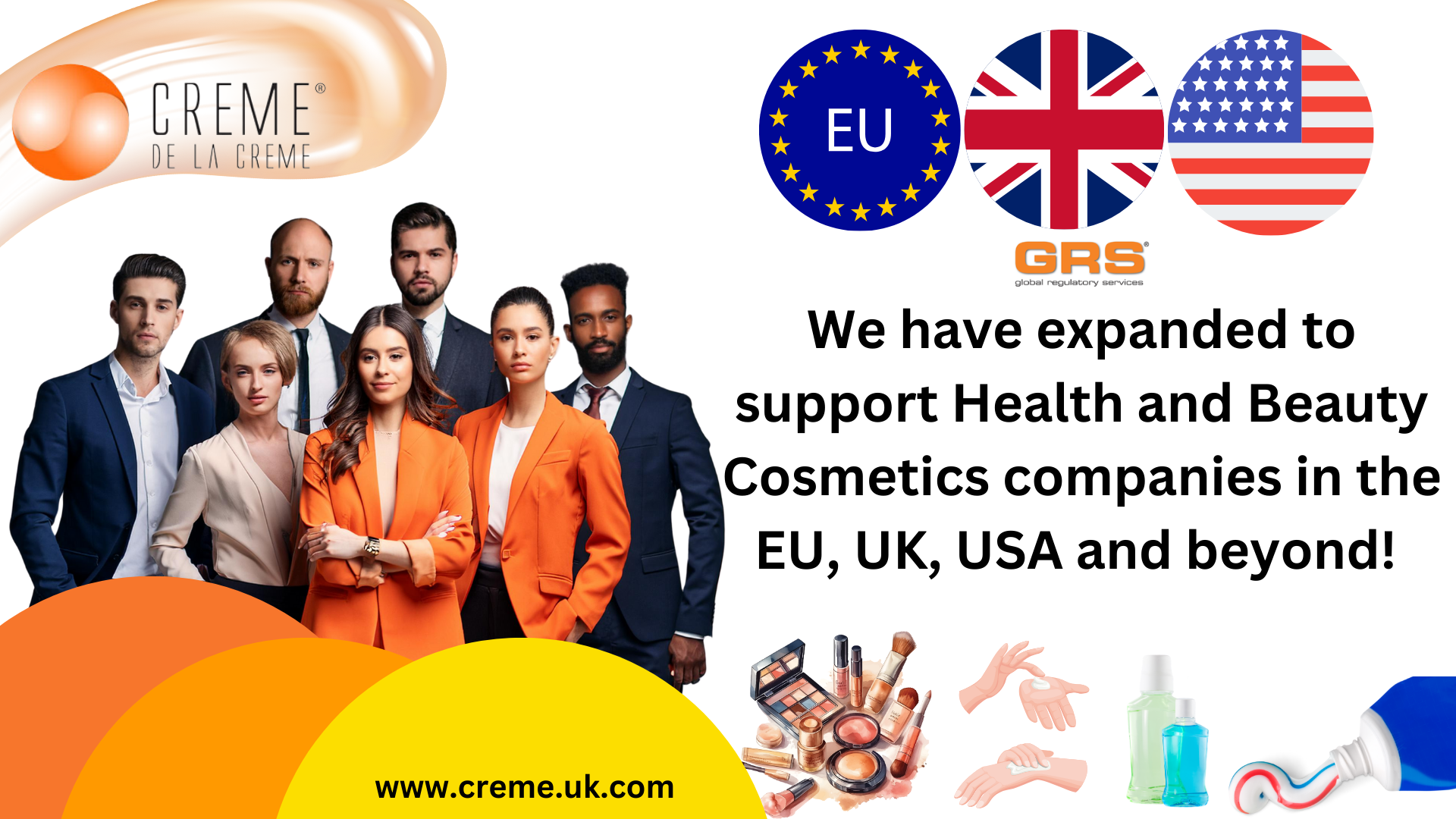
Conclusion: Seize the Opportunity
The winter holiday season presents an unparalleled opportunity to launch your cosmetics and beauty products in the UK. By ensuring regulatory and quality compliance, understanding your target audience, and implementing a solid marketing strategy, you can position your brand for success in this competitive market.
Moreover, by taking the time to research and plan your international expansion, you can extend your brand’s reach and achieve long-term growth. The world is ready for your innovation—now is the time to shine and dazzle the beauty industry with your unique creations.
For more information on how we can assist your business, visit our website and contact our team of experts. Let's work together to create a safer, more sustainable future for cosmetics.
Reach out to us by sending an email to creme@creme.uk.com or submitting a web form via https://www.creme.uk.com/contact-us